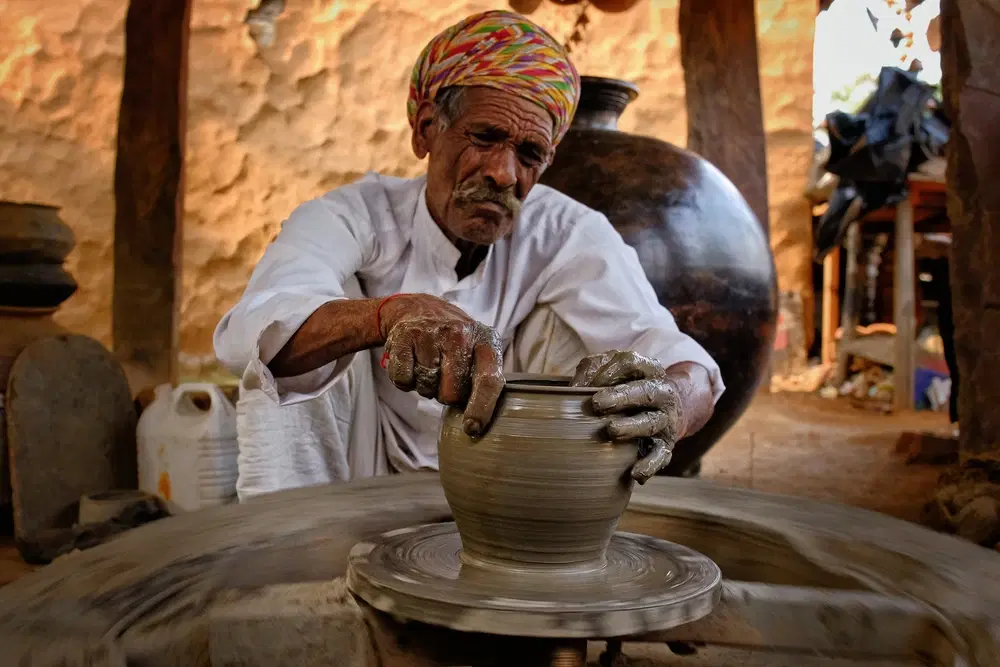
Hotels
•04 min read

Pottery village workshops in India offer a magical escape into the heart of traditional craftsmanship. Here, creativity meets heritage in an immersive, hands-on pottery experience that not only teaches you the art of working with clay but also offers a window into the cultural soul of India. In this blog, you'll find answers to common questions about these unique workshops, learn about traditional pottery making techniques, and get tips on how to plan your visit to these charming village retreats.
Pottery village workshops are specially organized programs that take place in rural Indian settings. These workshops preserve local pottery traditions by allowing participants to work directly with clay and learn time-honored techniques. They offer a guided, hands-on pottery experience, where every session becomes an opportunity to connect with the soul of traditional pottery making.
The appeal of learning pottery in a village setting lies in its authenticity. There is a serene atmosphere, far from the bustle of city life, where traditional methods are celebrated. These workshops cater to both beginners curious about clay art workshops and experienced artists looking to refine their techniques. The blending of local pottery traditions with an immersive, hands-on approach makes every session not just a class but a cultural journey that resonates with the wanderer, the planner, the professional, and the luxury seeker alike.
For travelers seeking a brief yet enriching experience, short-term workshops offer a daily or weekend foray into the world of pottery. They are perfect for those who desire a quick introduction to traditional pottery making and the chance to create something unique. Activities like DIY paint-on-pottery sessions and pottery wheel experiences are common, letting you dip your hands into clay art in a fun and interactive environment.
If you're ready for a deeper dive, long-term courses provide residential experiences that span from one week to several months. These ceramic art classes in India allow you to perfect advanced pottery techniques such as Naked Raku or even screen printing on clay. By living and learning in a village setting, you not only hone your skills but also embrace an immersive cultural lifestyle.
Specialized workshops focus on specific techniques and artistic styles such as terracotta or intricate ceramic art. These sessions sometimes form part of village pottery tours that blend cultural exploration with focused, hands-on learning. Whether you are passionate about handmade pottery techniques or eager to absorb centuries-old local pottery traditions, there's a workshop tailored for you.

During these workshops, you will engage directly with clay through activities like wheel throwing, sculpting, and molding. Every step of the process is overseen by skilled local artisans who share their techniques and stories. This hands-on pottery experience not only builds your technical skills but also enriches your creative expression and appreciation for the tradition.
These workshops are more than just craft classes; they are cultural journeys. You'll have opportunities to interact with native artisans, understand the significance of regional pottery traditions, and even participate in village rituals. Walking through the lanes of a rustic village and sharing in the everyday life of craftsmen deepens the connection between art and culture.
The facilities in these workshops are designed for both comfort and functionality. Workshops typically feature well-equipped studios with all necessary tools and materials. Residential courses ensure that you have comfortable accommodations right next door, allowing you to fully immerse yourself in the creative environment without interruptions.
Many pottery village workshops in India use locally sourced clay, ensuring that each piece reflects the unique characteristics of the region’s soil and traditions.
Across India, several regions are celebrated for their rich heritage in pottery. Destinations in Rajasthan, Himachal Pradesh, and Kerala are particularly notable for their vibrant pottery traditions. These regions offer serene village settings where the art of pottery thrives in natural, inspiring surroundings.
Selecting a workshop depends on your goals and skill level. Consider the duration, the focus of the sessions, and whether the workshop is more aligned with traditional pottery making or modern ceramic art classes in India. Evaluate factors like group size, the expertise of the instructors, and what amenities are provided. Each workshop is designed to meet different needs, ensuring that every participant experiences growth and creativity.

The ideal time to visit these workshops depends on the local climate and festival seasons. Generally, the cooler months are preferable for outdoor elements of the workshops. Plan your visit to coincide with local festivals, which further enrich the cultural experience by showcasing traditional music, dance, and celebrations.
The cost varies depending on the duration and type of workshop. Short-term workshops may start at ₹500 per session, while residential courses can range from ₹10,000 to ₹50,000 or more.
No, most workshops cater to beginners as well as experienced artists. Instructors provide step-by-step guidance tailored to your skill level.
Typically, all materials are provided by the workshop. You may want to bring comfortable clothing, closed-toe shoes, and a notebook for taking notes.
Yes, many workshops offer family-friendly sessions and activities designed for children, such as DIY paint-on-pottery experiences.
Yes, most workshops allow participants to keep their creations after they are fired and finished.
In summary, pottery village workshops in India provide a unique blend of hands-on learning, cultural immersion, and artistic exploration. These workshops capture the essence of traditional pottery making while welcoming a diverse group of enthusiasts—from wanderers to professionals. The experience is not only about refining your craft but also about connecting with age-old traditions and the scenic beauty of rural India.